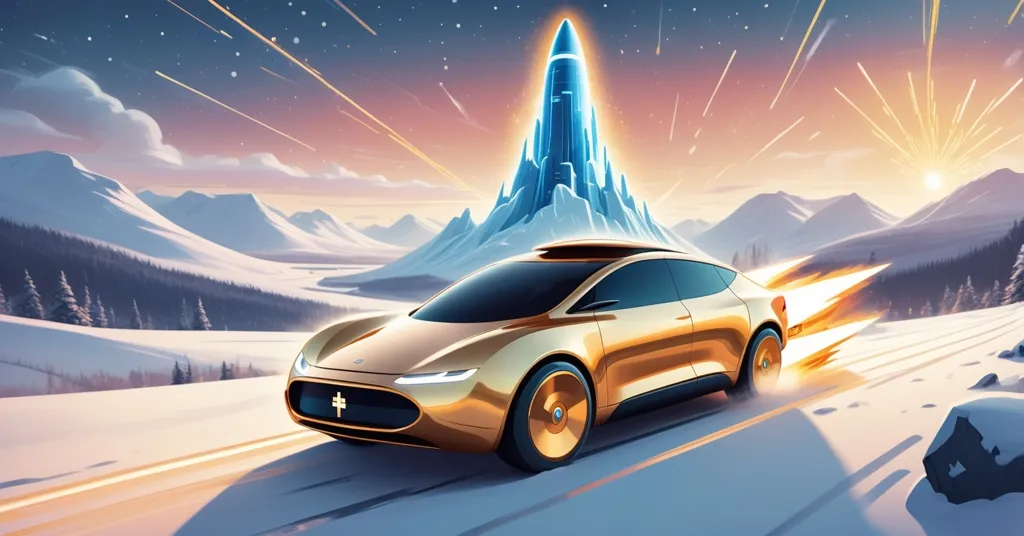Tesla Dominates Norway EV Sales as SpaceX Bitcoin Holdings Surpass $1 Billion

Tesla Charges Ahead in Norway as SpaceX Bitcoin Holdings Break $1 Billion
Tesla is holding its ground in Norway’s electric vehicle (EV) market with a remarkable 24% sales surge in the first half of 2025, defying broader European declines and growing unease with Elon Musk’s political antics. Meanwhile, SpaceX, another of Musk’s brainchildren, has amassed over $1 billion in Bitcoin (BTC), riding the crypto’s latest all-time high. This dual story of EV dominance and crypto boldness under Musk’s empire showcases both the promise and the pitfalls of disruptive tech and finance in 2025.
- Tesla’s Norwegian Edge: Sales up 24% in H1 2025, fueled by brand loyalty and promos, despite competition and Musk backlash.
- SpaceX’s Crypto Haul: Bitcoin stash hits $1.02 billion with 8,285 BTC, mirroring Tesla’s $1.42 billion holdings.
- Risks and Rewards: EV rivals close in, and crypto volatility looms large over Musk’s high-stakes plays.
Tesla’s Norwegian Triumph and Trials
Norway, often dubbed the EV capital of the world thanks to hefty government incentives like tax exemptions and toll waivers, remains a stronghold for Tesla, marking it as the company’s second-largest European market. A reported 24% year-on-year sales increase in the first half of 2025 is a standout, especially against a backdrop of a 33% sales drop across Europe, where Tesla’s market share slid from 2.4% to 1.6%. While specific Norwegian figures await further confirmation amid these regional declines, the growth tracks with the country’s unmatched EV adoption—battery electric vehicles (BEVs) account for 17.4% of Europe’s market in H1 2025, with Nordic nations leading the pack, as detailed in the overview of Norway’s EV market. Tesla’s deep roots in Norway, stretching back over a decade, have forged a unique bond, as Christina Bu, Secretary General of the Norwegian EV Association, captured perfectly:
“In many ways, you could say Norway helped build Tesla. Everyone in Norway knows someone who owns a Tesla. It’s more personal.”
This personal connection, paired with aggressive promotional tactics like zero-interest financing and free supercharging, has kept Tesla revving ahead in Norway. Historically, Tesla has dominated here, holding upwards of 20% market share in peak years, a legacy that competitors are only now starting to chip away at. Yet, the ride isn’t without bumps. Volkswagen briefly snatched the top EV seller spot in Q1 of 2025, and Chinese manufacturers like BYD, XPeng, and MG are accelerating fast, collectively grabbing 12.3% of new sales in June, as highlighted in a report on Tesla’s competition with Chinese brands. BYD alone posted a jaw-dropping 311% sales increase across Europe to 70,500 units, while MG, under SAIC Motor, outpaced Tesla with 162,153 units sold in H1, according to recent European car sales data. These brands blend affordability with a mix of BEVs, plug-in hybrids, and even internal combustion engine (ICE) vehicles—a flexibility Tesla’s pure-BEV focus can’t match.
Then there’s the Elon Musk headache. His loud right-wing rants on platforms like X are rubbing plenty of Norwegians the wrong way. A Norstat poll from February 2025 found that 40% of Norwegian Tesla owners think Musk’s political activism tarnishes the brand, as explored in a survey on Musk’s political impact on Tesla loyalty. It’s the age-old clash: adore the sleek Model Y, but cringe at the CEO’s latest hot take. Still, over half of those polled would consider buying another Tesla, hinting that product quality and that long-standing loyalty might just outmuscle personal gripes—for now. On the flip side, Musk’s unfiltered anti-establishment vibe could draw a niche of buyers who vibe with his rebellion, much like Bitcoin’s allure for those sick of centralized systems. But if discontent festers or rivals like BYD play the “we’re not Musk” card in marketing, even Norway’s loyalty could waver, a sentiment echoed in online discussions on Tesla’s growth amidst controversy.
SpaceX’s Bitcoin Bet: Genius or Gamble?
While Tesla battles for EV supremacy on the ground, SpaceX is blasting off in the financial stratosphere with its Bitcoin holdings hitting $1.02 billion, comprising 8,285 BTC, according to blockchain analytics firm Arkham Intelligence, as reported in a detailed analysis of SpaceX’s BTC stash. Tesla isn’t far behind, with 11,509 BTC valued at $1.42 billion. This milestone lands as Bitcoin smashes past an all-time high of $123,117 in mid-August 2025, boasting a market cap of $2.452 trillion—edging out even Google’s $2.448 trillion. For us Bitcoin maximalists, this is a glorious middle finger to fiat fragility, a sign that even corporate giants are betting on decentralization over dusty central bank notes. The timing couldn’t be sweeter, with stable U.S. Consumer Price Index data at 2.7% and whispers of interest rate cuts in September boosting risky assets like BTC—lower rates often mean cheaper borrowing and more cash flowing into speculative markets, as Paul Howard, Senior Director at crypto market maker Wincent, pointed out:
“Markets had anticipated July’s CPI to tick up slightly to 2.8% from June’s 2.7%. Instead, the figure held steady despite inflationary pressure from tariffs. This outcome is bullish for BTC and ETH, as it increases the likelihood of a potential U.S. rate adjustment.”
But let’s not get drunk on hopium. Both SpaceX and Tesla have been burned by Bitcoin’s wild swings before. SpaceX’s stash peaked at $1.8 billion with 28,000 BTC in April 2021, only to dump 70% of it in mid-2022 during a brutal crypto winter sparked by the Terra-Luna collapse—a $40 billion algorithmic stablecoin fiasco in May—and the FTX implosion in November, which wiped out billions in investor funds. Tesla pulled a similar retreat, offloading a hefty chunk of its BTC that same year. These weren’t knee-jerk panic sells; they were cold, calculated moves in a market that can flip from euphoria to despair overnight. So, are SpaceX and Tesla now hedging against inflation, riding Musk’s crypto evangelist hype (he’s long tweeted BTC as a shield against devaluing fiat), or just cashing in on a price spike, a strategy unpacked in a review of their Bitcoin investment approach? More damningly, are they playing crypto casino while rockets and cars take a backseat? That’s a gamble even Musk might not bluff his way through.
Another wrinkle: the data from Arkham Intelligence isn’t independently verified. Blockchain analytics can be murky, and there’s a chance these wallet figures are off or misinterpreted. Plus, in a 2025 crypto landscape buzzing with regulatory noise—think U.S. Bitcoin reserve rumors or the EU’s MiCA framework tightening rules—massive corporate holdings face both upside and scrutiny. For Bitcoin purists, SpaceX and Tesla’s stashes validate BTC as a treasury asset, akin to MicroStrategy’s playbook. Yet, there’s a devil’s advocate angle: if too few entities hoard giant stacks, doesn’t that risk centralizing the very ethos of decentralization we champion? And let’s not forget altcoin ecosystems like Ethereum, which prioritize utility over store-of-value with DeFi innovations BTC doesn’t touch. While we lean maximalist, we can’t ignore that other blockchains fill niches Bitcoin shouldn’t—or can’t—tackle, a debate often raised in discussions on Musk’s influence on crypto markets.
Musk’s Dual Empire: Disruption Under Scrutiny
Zooming out, Tesla’s Norwegian saga and SpaceX’s Bitcoin billion paint a picture of Musk’s empire as a juggernaut of disruption, thriving on risk but never immune to blowback. Norway proves that early mover advantage can cement cultural staying power—just as Tesla pioneered EVs there, Bitcoin could redefine finance if adoption barriers fall. This mirrors the effective accelerationism we root for: push tech forward, fast, and let the chips fall where they may. Yet, cracks show. Chinese EV brands are revving up like underdog racers, ready to lap Tesla if it doesn’t shift gears on pricing or variety. Public sentiment on Musk teeters, and crypto’s volatility looms as a shadow over billion-dollar bets, a dynamic captured in a broader look at Tesla’s success and SpaceX’s BTC milestone.
Then there’s a quieter tension. Tesla’s EVs, for all their innovation, collect heaps of driver data—hardly the privacy-first stance we’d expect from a guy hyping Bitcoin’s freedom. Is this a contradiction in Musk’s “pro-liberty” narrative, or just business as usual in tech? It’s a nagging thought for those of us who see decentralization as more than a buzzword. Meanwhile, X chatter and forum buzz reveal split opinions: some hail Musk as a visionary stacking BTC against a crumbling fiat system; others scoff at him as a distraction, juggling cars, rockets, and crypto while competitors sharpen their knives. Love him or hate him, Musk’s moves keep us glued to the drama.
Key Takeaways and Questions
- How is Tesla maintaining dominance in Norway amid fierce competition?
Tesla’s 24% sales growth in H1 2025, driven by deep-rooted brand loyalty, government-backed EV incentives, and perks like zero-interest financing, keeps it ahead, though rivals like BYD and Volkswagen are gaining ground with affordability and diverse offerings. - Does Elon Musk’s political stance threaten Tesla’s brand in Norway?
Yes, with 40% of owners citing his activism as a negative per a Norstat poll, but over half still eye another Tesla, showing product appeal often overshadows personal politics—at least for now. - Why are SpaceX and Tesla’s Bitcoin holdings significant right now?
With Bitcoin hitting an all-time high above $123,000 and a market cap topping Google’s, SpaceX’s $1.02 billion and Tesla’s $1.42 billion stashes signal corporate faith in crypto’s rise, boosted by economic tailwinds like potential U.S. rate cuts. - Are Chinese EV manufacturers a serious threat to Tesla in Norway?
Damn right, with BYD, XPeng, and MG snagging 12.3% of new sales in June through cheaper prices and varied models, they challenge Tesla’s BEV-only strategy in a market increasingly sensitive to cost. - Should SpaceX and Tesla’s Bitcoin focus worry us given past market crashes?
Hell yes, their 2022 sell-offs during Terra-Luna and FTX meltdowns show they know the risks, yet holding billions in BTC now raises questions about whether this aligns with building cars and rockets or just courts unnecessary chaos. - How does SpaceX’s Bitcoin play reflect broader corporate crypto trends in 2025?
It mirrors a growing acceptance of BTC as a treasury asset, seen with firms like MicroStrategy, signaling trust in crypto as a hedge, though the specter of volatility and regulatory shifts keeps the gamble real.
Tesla’s grip on Norway and SpaceX’s dive into Bitcoin are more than flashy headlines—they’re raw case studies in balancing innovation, public perception, and sheer audacity. As Bitcoin maximalists, we salute the crypto flex as a jab at traditional finance, but let’s keep it real: volatility bites hard, and EV competition is just as ruthless. Whether you’re a gearhead or a hodler, Musk’s rollercoaster is a hell of a ride—stay sharp, because the turns only get tighter from here.



